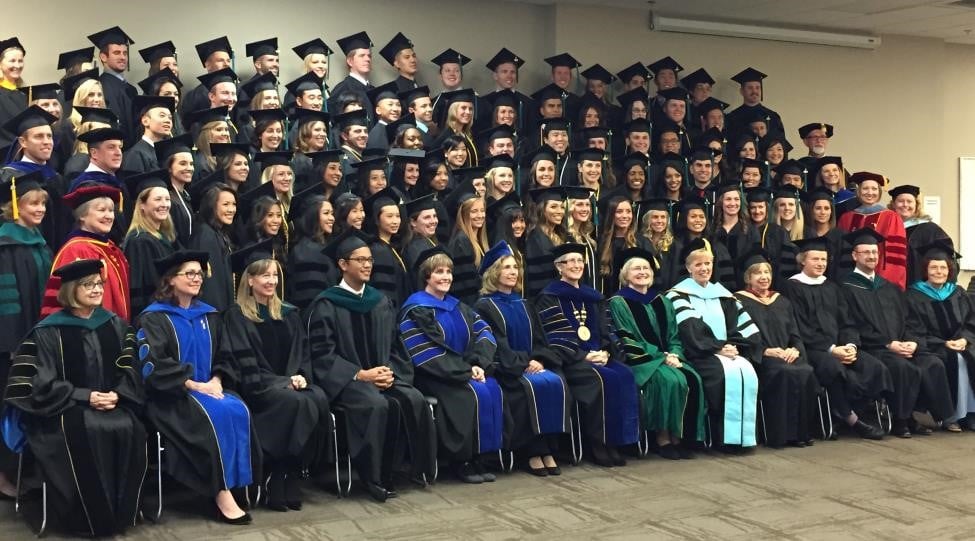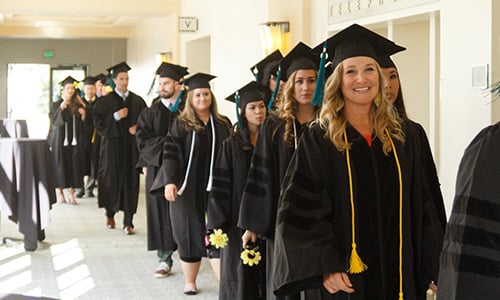This innovative equipment on the University’s Texas campus is the first of its kind to be easily accessible to patients in the Austin community who have suffered a neurological injury such as a stroke, spinal cord injury, spina bifida, multiple sclerosis, and traumatic brain injury, as well as to geriatric patients who are at risk for injury from falls
University of St. Augustine for Health Sciences (USAHS) unveils innovative SafeGait 360 on its Austin campus for physical and occupational therapy education, research and community service. Pictured (left to right): Dan Sauda, Gorbel Medical, Dr. Wanda Nitsch, President, USAHS, Dr. Susan Saxton, CEO, USAHS, Paula Singer, Chair, USAHS Board of Directors, Hope Young, Center for Music Therapy, Inc., and Dr. Elizabeth Ardolino, USAHS
Austin, Texas – September 29, 2016 – University of St. Augustine for Health Sciences (USAHS), a leading graduate institution that emphasizes health and rehabilitative sciences education through innovative classroom education, is pleased to announce the installation of SafeGait 360° Balance and Mobility Trainer® on its Austin, Texas campus. The device, which was designed in collaboration with experts in physical therapy (PT) and occupational therapy (OT), works to mitigate the risk of injury from falls, protecting both the patient and therapist. In addition, SafeGait 360°’s dynamic fall protection (DFP) distinguishes between a patient’s intentional downward movement and when a patient is actually falling, which allows therapists to easily modify fall protection sensitivity to accommodate and challenge patients at varying stages of independence.
USAHS is one of the first higher education institutions in the nation to install this innovative body-weight support and fall protection system. In addition to conducting ground breaking research with patients and students, faculty members with extensive experience in body-weight treatments aim to open a clinic which will provide new treatment options to patients in the Austin community, and will begin seeing patients in October of this year.
Using SafeGait 360° to Treat Patients in Austin
SafeGait 360° is essential in providing advanced treatment solutions to a variety of patients, but especially patients who suffer from a neurological injury, such as a stroke, spinal cord injury, spina bifida, multiple sclerosis and traumatic brain injury.
“My interest in using body-weight support systems to treat patients began when I was clinician,” said Elizabeth Ardolino, PT, MPT, MS, PhD, assistant professor of neurology and research, at USAHS and a physical therapist with more than 15 years of experience. “I was passionate about bringing SafeGait 360° to our institution because there is no equipment like this in the immediate Austin area. At USAHS, we are able to offer our expertise to people in our local community who need it most: patients with neurological injuries, geriatric patients, patients who have been discharged from traditional physical therapy treatments, and patients who may not have the health insurance benefits to cover extensive therapeutic care.”
In addition, the equipment will be used for research and to provide treatment for orthopaedic patients and to geriatric patients, who are at a risk for injury from falls.
“When someone suffers from medical issues or injuries and is learning to walk again, one of the top fears that comes to the individual is the fear of falling,” said Dr. Wanda Nitsch, president and chief academic officer, USAHS. “With the innovative SafeGait 360°, those individuals can bypass this fear and gain the necessary confidence needed in their treatment plan. This technology is revolutionary and will provide our faculty and students with a great hands-on learning experience.”
Using SafeGait 360° for Innovative Research
At USAHS, many faculty members are planning to use SafeGait 360° to conduct research with both students and patients.
“I plan to use SafeGait 360° in three ways: in the classroom, in the community and through research,” said Ardolino. “This fall, we plan to launch a study on children with spina bifida. We will be testing a tool designed to measure how children with spinal cord injuries and spina bifida recover after their injury, and part of that tool requires the use of a body-weight piece of equipment. SafeGait 360° allows us to really test that tool to full extent of its capability. After we test that tool and have something that we can use to measure the children’s progress, we hope to do an intervention study and bring those children in to train them on SafeGait 360° and see how they progress.”
Paula Singer, Chair, USAHS Board of Directors, shares how the new SafeGait equipment will be used in health sciences education, research and community rehabilitation with geriatric patients and patients with neurological injuries in Austin.
Incorporating SafeGait 360° in Education
At USAHS, it’s not just about having the equipment, it’s about knowing how to use it. USAHS faculty members have experience in using body-weight support equipment with patients, and have done previous research in body-weight supported treadmill training.
“It’s important to know and understand what has worked from a research standpoint, and how to translate that into the clinic,” said Ardolino. “There’s a difference between having the equipment and knowing what to do with it, and having the theoretical foundation behind why you’re using the equipment the way you are with the patient. We are incorporating SafeGait 360° into our students’ coursework and labs so that when they graduate from USAHS, they will really know how to use a body-weight support system, and how use it well.”
Currently, students at USAHS work in Patient Oriented Integrated Neurological Treatment (POINT) labs, with real-life patients, at the guidance of their faculty members. Through the POINT labs, USAHS brings patients with neurological disorders into the classroom, where they are evaluated and treated by the students over a four week period.
“If we can give our patients something that is new and provide our students with a different way of looking at how to treat someone with their injuries than they have had before, we are improving the learning experience for our students, and improving the lives of the patient,” said Ardolino.
What’s different about SafeGait 360° at USAHS?
“Most graduate physical therapy and occupational therapy institutions do not have this type of innovative equipment on their campus, accessible to both faculty and students to use with local patients,” said Nitsch. “Our students will be trained on the equipment, from faculty experts, and have the opportunity to work with patients and see the positive impact the use of this equipment can have on their treatment, their progress, and their lives.”
About SafeGait 360°
SafeGait 360° features easy to use patient management software, which is an intuitive user interface allowing therapists to track and compare session and task data. Therapists can also create a plan of care that is specific to individual patient needs by choosing from an extensive list of transfer, gait and stair tasks, or customizing their own. The treatment options are aimed at challenging patients through setting goals, capturing rated perceived exertion (RPE) and measuring performance in real time.
Additional features include:
· 1:1 Patient/Therapist Ratio: Compared to traditional gait therapy, which requires multiple therapists to safely work with a single patient, SafeGait 360° can optimize resources and enable a safe 1:1 patient/therapist interaction
· More Patients Per Day: By reducing the number of providers required per patient, SafeGait 360° can help enable facilities to maximize patient throughput
“For over 35 years the University of St. Augustine for Health Services has been improving people’s lives, so with Gorbel’s Mission statement being to ‘Improve People’s Lives,’ I see it as no coincidence that our team and USAHS have come together to bring the Austin community the benefits of SafeGait,” said Brian Reh, president and CEO, Gorbel. “On behalf of Gorbel, let me share that we feel privileged to have a partner as engaged and forward thinking as USAHS. While it might seem more common to have products like SafeGait solely in a hospital setting, USAHS goes beyond and is leveraging the technology across the university model. I find it special and unique for a university to bring new, innovations to students, to their community and to research. Here’s to USAHS and the university’s next 35-plus years of improving lives!”








